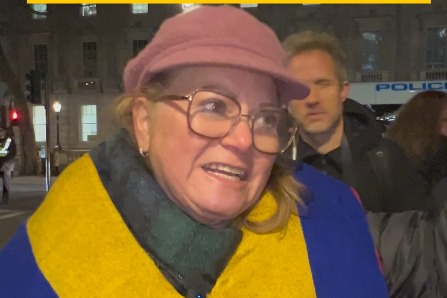Hallmark of civil disobedience is rejecting violent methods

Civil disobedience as a means of protest against unjust civil or political situations is nothing new. The term defines actions taken as "non-violent", no more, no less. Historically, the Egyptians started to adopt civil disobedience measures in 1919 against British occupation while Mahatma Gandhi utilized it in the 1930's against the unjust salt tax regime in India imposed by Britain, the country's then political master.
Notable civil rights campaigners who were also Nobel Peace Prize laureates such as Martin Luther King Jr., Nelson Mandela and F.W. de Klerk, David Trimble and John Hume represented the truthful and genuine meaning of civil disobedience when they fought for civil and political rights in the United States, acted against the evils of apartheid in South Africa and promoted the Good Friday Agreement for long-term and sustainable peace in Northern Ireland respectively in the '50s, '60s and '90s.
All, one must carefully note, were accomplished by non-violent and peaceful means.

In September 2014, student activists in Hong Kong called for a class boycott assembly outside the Central Government Offices (CGO) in Admiralty and they were granted a "notice of no objection" for the assembly. However, 90 minutes before expiry of this "lawful assembly", student leaders incited protesters to climb over the fence of the closed East Wing Forecourt of CGO in order to "reclaim" it. Not only would this act make the assembly "unlawful", they also inadvertently jumped the gun by starting the "Occupy Central" movement before the planned date of Oct 1, without consulting its organizers. The irresponsible and reckless behavior of the student activists resulted in chaos, disorderly conduct, violence, physical injuries and criminal damage to properties.
Three student activists from the Hong Kong Federation of Students and Scholarism were originally arrested and given community-service sentences. The secretary for justice applied for a review of their sentences before the trial magistrate and was dismissed. An appeal to the Court of Appeal was subsequently applied for and was granted. The Court of Appeal's judgment was to have all three of them jailed, for six to eight months.
The sentences, as one would expect, provoked adverse comments such as "infringement of judicial independence" and "political persecution" in the special administrative region. Commentators and politicians, notably from the United States and United Kingdom, also jumped on the bandwagon and denounced the secretary for justice for applying for a sentencing review which resulted in imprisonment of the three activists. Some of these commentators even suggested these young activists were after all only exercising their freedoms and democratic rights. The lawless situation they created as a result was simply glossed over and forgotten. Commentators chose to ignore the fact that these activists had infringed upon Hong Kong's Public Order Ordinance by overlooking "public safety, public order and the protection of the rights and freedoms of others" with their impromptu and violent actions.
Those who are interested in what has been happening in the SAR over the past few years should definitely appreciate the importance of upholding the rule of law and protection of freedom and democracy in Hong Kong. In securing these principles, it is equally important to respect the freedoms and democratic rights of all citizens and not just the preserve of activists. It would be totally unfair and unjust for a few to monopolize their freedom of speech and democratic rights at the expense of other's inconvenience and personal safety.
Young activists might believe they are entitled to unlimited freedom in exercising their democratic and political rights regardless of the rights of others, or perhaps "equality" is not in their vocabulary after all. They need to be reminded that according to the Basic Law, the SAR has a duty to "safeguard the rights and freedoms of the residents". This means all residents and not just for a few.
There are significant differences in actions taken by those who advocate civil disobedience and those who organize demonstrations while ignoring public safety and order. As in many cities around the world, demonstrations and assemblies take place in the SAR on a daily basis. What happened on Sept 28, 2014 and the next 79 days were definitely illegal and dangerous. The hundreds of citizens and police officers injured as a result was testament to this fact.
One would hope that commentators and politicians would take their responsibilities seriously in future when they want to proffer their biased observations and support to young activists who caused more harm to Hong Kong by their thoughtless and self-indulgent acts. All citizens in the SAR are entitled to their rights but these rights are not without boundaries. Before lambasting the "injustice" of imprisoning these young activists and complaining about the action taken by the secretary for justice, just remember the saying that "there is no point in pointing fingers because there are three fingers pointing back at you". Check the facts before condoning illegal actions unwittingly, for unsubstantiated and prejudicial comments are unwelcome, unhelpful and damaging to the SAR as a whole.
(HK Edition 10/16/2017 page8)






























